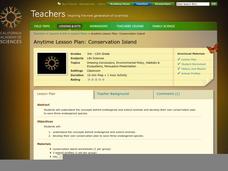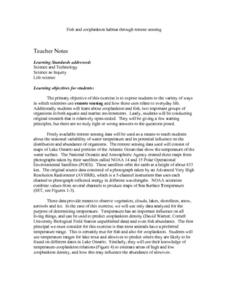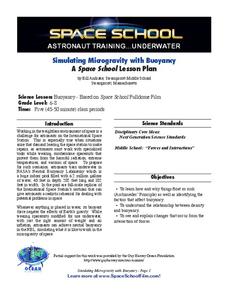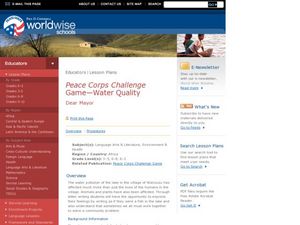California Academy of Science
Conservation Island
Why not walk in the footsteps of Teddy Roosevelt and become a conservationist? After discussing issues and reasons for animal extinction, the class creates their own conservation plans. Each small group is given mock data regarding a...
Curated OER
Do We Need to Wear a Rainhat? Acid Rain: Causes, Effects, and Possible Solutions
Acid rain, and how it affects the environment, is the focus of this Earth science lesson. During the study, learners evaluate measures to reduce acid rain, and design an investigation to demonstrate the conection between a hypothesis and...
Curated OER
Exploring Microclimates
Young scholars compare the land cover and temperatures in different microclimates to begin to explain why organisms live where they do. While exploring microclimates, students record temperature readings and detailed observations.
Curated OER
Digital Video Lesson Plan: Brine Shrimp
Learners participate in classroom experiment to gain better understanding of type of environment brine shrimp can best survive. Students then explore effects of common saltwater pollutants on survival of animals in sea.
Curated OER
Oil Spills: The Scientific Method in Action
Students write a clear and detailed procedure and explore the complications in trying to clean the environment. They develop various ways to solve a complex problem. Students are cognizant of the effects of pollution on the environment....
Curated OER
Layers of the Rainforest
What a great way to discuss the rainforest! Learners discuss the importance of adaptation in the environment and how it is linked to survival. They use critical thinking and inference skills to place animals and insects in the different...
Curated OER
Ecology
Students explore, experience and experiment identifying the human impact on the environment of vegetative differences within the same biome. They assess what causes deserts, rain forests, savannahs, tundras and saguaros and how these...
NOAA
Vertebrates II
Mammals of the ocean unite! Or not. The 20th installment of a 23-part NOAA Enrichment in Marine sciences and Oceanography (NEMO) program investigates how warm-blooded marine mammals survive in water. In the class activity, learners use...
Space Awareness
Coma Cluster of Galaxies
Scientists classify everything from the smallest cells to the largest galaxies, but how do they decide on a classification system? Scholars use 40 pictures of galaxies taken by the Hubble Space Telescope to sort and try creating their...
Curated OER
Plankton in the Air
Here is a lab activity adequate for use with any full lesson plan on environmental factors that shape animal adaptations or marine animal characteristics. Pupils will discuss the role plankton plays in the environment and filter-feeding...
Curated OER
Wild Where?
Students investigate why the urban environment is considered a hostile environment; define the concept of endangered species; describe and identify a Peregrine Falcon; describe and identify the eating habits of the Peregrine Falcon.
Curated OER
Water Quality and Environmental Pollution
Learners use litmus paper to begin to discover the qualities of acids and bases. They learn about pH by testing clear liquids for acidity with purple cabbage juice as an indicator. The video Streamkeeper, with Bill Nye, and other video...
Curated OER
Environmental Exchange Box
Young scholars examine the characteristics of their own environment and compare them to another region. They prepare a box filled with items and stories about their own region, exchange the box with another class in another region, and...
Curated OER
Visual Vocabulary
Students interpret and name the vocabulary termed acted out by the mime. In this science/language arts/physical education lesson, students are given a set of vocabulary terms to discuss within their group. Next, students place all...
Science Matters
Lotusland
It's time for a field trip! Scholars take their new-found knowledge of adaptations and seed dispersal on a field trip to a local botanical garden. They gain an up-close look at how ecological interdependence works in a distinct...
Curated OER
Praire Biome Models
Fifth graders, in groups, list the physical characteristics of a biome and think of ways in which animals might have to adapt to live there and make a biome mobile ball that show the different types of habitats that shape the praire biome.
ARKive
Animal over Winter
Gosh those polar regions can get cold. So, how do the animals that live there survive the long winters? Learners explore how animals adapted to survive harsh wintry conditions by completing a worksheet and comparing animal survival...
Curated OER
Big Arky, A Real Arkansas Monster
Middle schoolers examine the world of the Arkansas alligator and topics that are related to wetland environments. They pay attention to the relationship between geography, climate, environment, and the animals who live there. A role-play...
Curated OER
Fish and zooplankton habitat through remote sensing
Students are exposed to the variety of ways in which scientist use remote sensing and it used in everyday life. They investigate about zooplankton and fish. Students list the two important groups of organisms in both aquatic and marine...
Florida International University
Simulating Microgravity with Buoyancy
How do astronauts know how to live and work in a weightless environment? It doesn't come naturally! Junior physicists conduct experiments to examine the link between buoyancy and microgravity. Each activity illustrates a different aspect...
UAF Geophysical Institute
Carbon Footprint
Your young environmentalists can calculate their carbon footprint and discuss ways to reduce it with a worksheet about climate change. After reading a handout about what impact one's carbon footprint can have on the environment, kids...
Polar Trec
Animal Monitoring Introduction
Not only do mealworms taste great, they are also great for classroom science lessons. In pairs, young scientists observe and record what they see as they check out what their mealworms are doing from minute to minute. Each minute...
SeaWorld
Animal Husbandry
Learners study how changes in the environment can drastically affect the survival of an animal. After a class discussion, pupils are divided up into groups and are given the task of coming up with the best environment to allow brine...
Curated OER
Peace Corps Challenge Game- Water Quality
Students advocate for clean water. In this water pollution lesson, students play the Peace Corps Challenge Game, discuss the effects of polluted water and write a letter to the mayor of Wanzuzu highlighting the situation of the...























